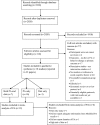A systematic review and meta-analysis of social cognitive theory-based physical activity and/or nutrition behavior change interventions for cancer survivors
- PMID: 25432633
- PMCID: PMC4441740
- DOI: 10.1007/s11764-014-0413-z
A systematic review and meta-analysis of social cognitive theory-based physical activity and/or nutrition behavior change interventions for cancer survivors
Abstract
Purpose: Little is known about how to improve and create sustainable lifestyle behaviors of cancer survivors. Interventions based on social cognitive theory (SCT) have shown promise. This review examined the effect of SCT-based physical activity and nutrition interventions that target cancer survivors and identified factors associated with their efficacy.
Methods: A systematic search of seven databases identified randomized controlled trials that (i) targeted adult cancer survivors (any point from diagnosis); (ii) reported a primary outcome of physical activity, diet, or weight management; and (iii) included an SCT-based intervention targeting physical activity or diet. Qualitative synthesis and meta-analysis were conducted. Theoretical constructs and intervention characteristics were examined to identify factors associated with intervention efficacy.
Results: Eighteen studies (reported in 33 publications) met review inclusion criteria. Meta-analysis (n = 12) revealed a significant intervention effect for physical activity (standardized mean difference (SMD) = 0.33; P < 0.01). Most studies (six out of eight) that targeted dietary change reported significant improvements in at least one aspect of diet quality. No SCT constructs were associated with intervention effects. There were no consistent trends relating to intervention delivery method or whether the intervention targeted single or multiple behaviors.
Conclusions: SCT-based interventions demonstrate promise in improving physical activity and diet behavior in cancer survivors, using a range of intervention delivery modes. Further work is required to understand how and why these interventions offer promise for improving behavior.
Implications for cancer survivors: SCT-based interventions targeting diet or physical activity are safe and result in meaningful changes to diet and physical activity behavior that can result in health improvements.
Figures
References
-
- Cramp F, Daniel J. Exercise for the management of cancer-related fatigue in adults (review). Cochrane Database of Systematic Reviews. 2008;CD006145. - PubMed
Publication types
MeSH terms
LinkOut - more resources
Full Text Sources
Other Literature Sources
Medical
Miscellaneous



